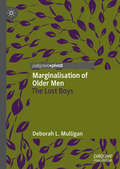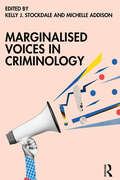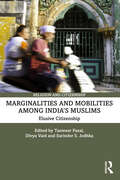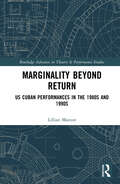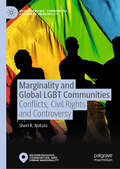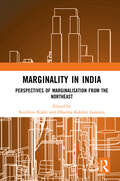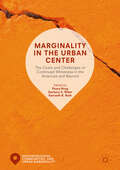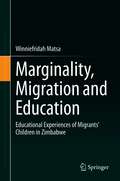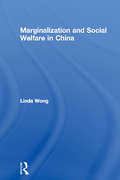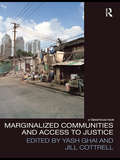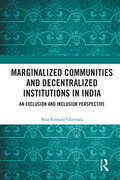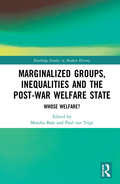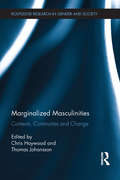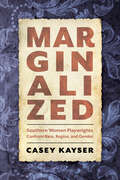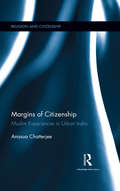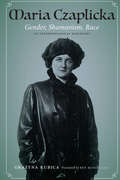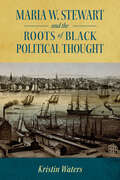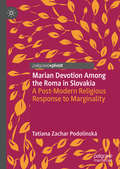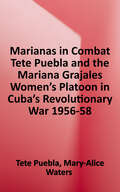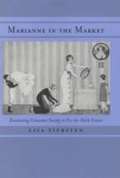- Table View
- List View
Marginalisation of Older Men: The Lost Boys
by Deborah L. MulliganMarginalisation of Older Men: The Lost Boys focuses on the phenomenon of the marginalisation of older men and the impact of gendered ageing as a pathologic disorder leading to suicide ideation, rather than a celebratory state. In this engaging investigation,Deborah Mulligan explains why and how some older men have become marginalised in society, and the effects of this social isolation. The book offers effective and unique methods for researching marginalised groups and individuals to maximise innovativeness, reciprocity and utility for research participants. Mulligan skilfully articulates and communicates the hitherto unheard voices of older males. These voices represent a vital element in the mitigation of loneliness, social isolation and suicide. The lived experience of these individual men and their peers provides vital health information for older men in both contemporary and future society.
Marginalised Mothers: Exploring Working Class Experiences of Parenting (Relationships and Resources)
by Val GilliesSuccessive moral panics have cast poor or socially excluded mothers - associated with social problems as diverse as crime, underachievement, unemployment and mental illness - as bad mothers. Their mothering practices are held up as the antithesis of good parenting and are associated with poor outcomes for children. Marginalised Mothers provides a detailed and much-needed insight into the lived experience of mothers who are frequently the focus of public concern and intervention, yet all too often have their voices and experiences overlooked. The book explores how they make sense of their lives with their children and families, position themselves within a context of inequality and vulnerability, and resist, subvert and survive material and social marginalisation. This controversial text uses qualitative data from a selection of working class mothers to highlight the opportunities and choices they face and to expose the middle class assumptions that ground much contemporary family policy. It will be of interest to students and researchers in sociology, social work and social policy, as well as social workers and policymakers.
Marginalised Voices in Criminology
by Michelle Addison Kelly J. StockdaleThis book is about people who are marginalised in criminology; it is an attempt to make space and amplify voices that are too often overlooked, spoken about, or for. In recognising the deep-seated structural inequalities that exist within criminal justice, higher education, and the field of criminology, we offer this text as a critical pause to the reader and invite you to reflect and consider within your studies and learning experience, your teaching, and your research: whose voices dominate, and whose are marginalised or excluded within criminology and why?This edited collection offers chapters from international criminology scholars, activists, and practitioners to bring together a range of perspectives that have been marginalised or excluded from criminological discourse. It considers both obscured and marginalised criminological theorists and schools of thought, presents alternative viewpoints on ‘traditional’ criminal justice themes, and considers how marginalisation is perpetuated through criminological research and criminological teaching. Engaging with debates on power, colonialism, identity, hegemony and privilege, and bringing together perspectives on gender, race and ethnicity, indigenous knowledge (s), queer and LGBTQ+ issues, disabilities, and class, this concise collection brings together key thinkers and ideas around concerns about epistemological supremacy.Marginalised Voices in Criminology is crucial reading for courses on criminological theory and concerns, diversity, gender, race, and identity.
Marginalisierte Gefühlswelten: Eine empirische Untersuchung der emotionalen Integrationsverläufe von Migrant*innen in Deutschland (Analysen zu gesellschaftlicher Integration und Desintegration)
by Coline KucheSubjektive Faktoren wie Emotionen von Personen mit Migrationshintergrund sind bisher ein Randthema in der sozialwissenschaftlichen Forschung. Daher untersucht die Studie migrantische Emotionserfahrungen im Zuge von Integrationsprozessen. Drei Forschungsfragen leiten die Untersuchung: "Gibt es emotionale Unterschiede zwischen Migrant*innen aus unterschiedlichen Herkunftsländern und der Aufnahmebevölkerung?", "Wie entwickeln sich emotionale Befindlichkeiten von Migrant*innen im Zeitverlauf?", "Welchen Einfluss üben sonstige Integrationsprozesse auf die emotionale Integration aus?". Für die Beantwortung der Fragen wird u.a. auf innovative Ansätze aus der Emotionssoziologie und Kulturpsychologie zurückgegriffen. Die abgeleiteten Hypothesen werden anhand der Daten des Sozio-oekonomischen Panels (SOEP), einer repräsentativen Bevölkerungsstichprobe Deutschlands überprüft. Die Studie legt offen, dass emotionale Unterschiede zwischen Personen mit und ohne Migrationshintergrund sowie in Abhängigkeit der kulturellen Distanz bestehen, welche sich durch das häufigere Auftreten von negativen Emotionserfahrungen für Migrant*innen äußern. Diese Unterschiede nehmen im Zeitverlauf eher zu oder stagnieren. Dabei stehen diese hauptsächlich in Zusammenhang mit wahrgenommenen Benachteiligungserfahrungen und einem Mangel an transnationalen Kontakten.
Marginalisierung, Stadt und Soziale Arbeit: Soziale Arbeit im Spannungsfeld von Politik, Quartierbevölkerung und professionellem Selbstverständnis (Quartiersforschung)
by Carlo Fabian Patrick Oehler Sandra Janett Jutta Guhl Bruno MichonDieser Open-Access-Sammelband zeigt auf, welche Themen mit Blick auf das Handlungsfeld Soziale Arbeit und Stadtentwicklung besonders relevant sind und zurzeit im Vordergrund stehen. Marginalisierte Menschen und Quartiere sind typische Phänomene sozialer Ungleichheit in modernen Städten, auf die sich Soziale Arbeit – von Beginn an – forschend und professionell handelnd bezieht. Themen, die in den Beiträgen verhandelt werden, sind unter anderem marginalisierte Quartiere, Segregation, Nachbarschaften, Community Organizing/Gemeinwesenarbeit, Partizipation, Integration, Sozialplanung, lokale Demokratie und soziale Innovation.
Marginalities and Mobilities among India’s Muslims: Elusive Citizenship (Religion and Citizenship)
by Surinder S. Jodhka Tanweer Fazal Divya VaidThis book studies how marginality impacts the everyday lives of Indian Muslims. It challenges the prevailing myths and stereotypes through which Indian Muslims have come to be seen in the popular imagination. The volume engages with questions of citizenship, collective violence, and issues of civil and criminal jurisprudence. It explores the linkages between development, marginality, and citizenship – the three critical issues for modern democracies today. Going beyond the singular narrative of a community on a continuous slide, the chapters in this volume present diversities of the Muslim experience of exclusion and participation. It discusses themes such as violence and marginality among minorities; Indian Muslims and the ghettoized economy; employment aspirations of low-income Muslim men; intergenerational social mobility of Muslims; the nature of the middle class; and the question of Islam, development, and globalization to showcase the living conditions of Muslims in India. Part of the Religion and Citizenship series, this timely volume will be an essential read for scholars and researchers of political studies, sociology, political sociology, minority studies, public policy, religion, citizenship studies, diversity and inclusion studies, and social anthropology.
Marginality Beyond Return: US Cuban Performances in the 1980s and 1990s (Routledge Advances in Theatre & Performance Studies)
by Lillian ManzorThis study is an exploration of US Cuban theatrical performances written and staged primarily between 1980 and 2000. Lillian Manzor analyzes early plays by Magali Alabau, Jorge Ignacio Cortiñas, María Irene Fornés, Eduardo Machado, Manuel Martín Jr., and Carmelita Tropicana as well as these playwrights’ participation in three foundational Latine theater projects --INTAR’s Hispanic Playwrights-in-Residence Laboratory in New York (1980-1991), Hispanic Playwrights Project at South Coast Repertory Theater in Costa Mesa, CA (1986-2004), and The Latino Theater Initiative at Center Theater Group's Mark Taper Forum in Los Angeles (1992-2005). She also studies theatrical projects of reconciliation among Cubans on and off the island in the early 2000s. Demonstrating the foundational nature of these artists and projects, the book argues that US Cuban theater problematizes both the exile and Cuban-American paradigms. By investigating US Cuban theater, the author theorizes via performance, ways in which we can intervene in and reformulate political and representational positionings within the context of hybrid cultural identities. This book will of great interest to students and scholars in Performance Studies, Transnational Latine Studies, Race and Gender studies.
Marginality and Global LGBT Communities: Conflicts, Civil Rights and Controversy (Neighborhoods, Communities, and Urban Marginality)
by Sheri R. NotaroThis book examines the interconnectedness of LGBT civil and political rights, bias, discrimination, homophobia, and LGBT health disparities both in the United States and globally. According to Notaro, the failure to extend equitable civil and political rights to LGBT individuals—combined with recent reversal of past gains—will continue to be associated with bias, stigma and discrimination toward the LGBT community. In turn, this sustained bias and stigma fosters a host of LGBT health disparities, including access to culturally competent health care, HIV/AIDS, substance use, homelessness, suicide, and violence. Thus, the bias and discrimination levied at the LGBT community is discussed as a major explanatory factor in life-threatening health disparities experienced by the community, particularly in urban areas worldwide. The volume provides a framework for considering future research that must identify ways to prevent these health disparities, being mindful of and harnessing the protective factors and supports that exist within the diverse LGBT community.
Marginality in India: Perspectives of Marginalisation from the Northeast
by Kedilezo Kikhi and Dharma Rakshit GautamThe book takes a close look into the definitions and categorizations of marginality, inequality, agency and location in society. It examines the systems of marginalization and othering by exploring perspectives of socially excluded people and communities in Northeast India. The context of Northeast India provides unique perspectives on the debates around marginality due to the existence of multi-ethnic cultures in the region and since its prolonged colonial historical experience alienated it from the rest of India. This volume focuses on the issues pertaining to tribe, caste, gender identity, religion, and physical disability in the region. It also looks at the roles which institutions, education and the media play in the creation and perpetuation of social exclusion and the centre—periphery binary. With essays from eminent scholars and social scientists, the book discusses themes such as citizenship and borders, national and tribal identity, the role of the law, government and policies for countering exclusion and the challenges which socially excluded groups and communities face to gain agency, autonomy and the right to equality. This book will be useful for scholars and researchers of sociology, Northeast India studies, political sociology, development studies, political science, gender studies, and social anthropology.
Marginality in the Urban Center: The Costs and Challenges of Continued Whiteness in the Americas and Beyond (Neighborhoods, Communities, and Urban Marginality)
by Peary Brug Zachary S. Ritter Kenneth R. RothThis book examines the increasing marginalization of and response by people living in urban areas throughout the Western Hemisphere, and both the local and global implications of continued colonial racial hierarchies and the often-dire consequences they have for people perceived as different. However, in the aftermath of recent U.S. elections, whiteness also seems to embody strictures on religion, ethnicity, country of origin, and almost any other personal characteristic deemed suspect at the moment. For that reason, gender, race, and even class, collectively, may not be sufficient units of analysis to study the marginalizing mechanisms of the urban center. The authors interrogate the social and institutional structures that facilitate the disenfranchisement or downward trajectory of groups, and their potential or subsequent lack of access to mainstream rewards. The book also seeks to highlight examples where marginalized groups have found ways to assert their equality. No recent texts have attempted to connect the mechanisms of marginality across geographical and political boundaries within the Western Hemisphere.
Marginality, Migration and Education: Educational Experiences of Migrants’ Children in Zimbabwe
by Winniefridah MatsaThis book provides a missing link between marginality, migration and education in Zimbabwe, focusing on the educational experiences of migrants’ children in an effort to influence government policies concerning migrant parents and their left-behind children. While there is a large body of knowledge on the education of children of immigrants in destination countries, this book aims to fill in the gap by addressing the children who do not migrate with their parents. Through this unique approach, the book examines the education statuses of these left-behind children, offering insights into their educational challenges, rights, and inequities to better inform policy decisions to meet the 2030 education agenda for action established by the United Nations in 2015. The book will of interest and use to governments, NGOs, teachers and local communities in Africa as a resource to better understand the situation of migrants’ left-behind children as a category of vulnerable children in difficult circumstances.
Marginalization and Social Welfare in China
by Linda WongThis book provides a systematic analysis that defines and accounts for the contours and operation of China's welfare system. It is underpinned by recent empirical research and strong comparative theory, and will be welcomed as a significant advance in furthering our understanding of social welfare in China.
Marginalized Communities and Access to Justice (Law, Development and Globalization)
by Yash Ghai Cbe Jill CottrellMarginalized Communities and Access to Justice is a comparative study, by leading researchers in the field of law and justice, of the imperatives and constraints of access to justice among a number of marginalized communities. A central feature of the rule of law is the equality of all before the law. As part of this equality, all persons have the right to the protection of their rights by the state, particularly the judiciary. Therefore equal access to the courts and other organs of the state concerned with the enforcement of the law is central. These studies – undertaken by internationally renowned scholars and practitioners – examine the role of courts and similar bodies in administering the laws that pertain to the entitlements of marginalized communities, and address individuals' and organisations' access to institutions of justice: primarily, but not exclusively, courts. They raise broad questions about the commitment of the state to law and human rights as the principal framework for policy and executive authority, as well as the impetus to law reform through litigation. Offering insights into the difficulties of enforcing, and indeed of the will to enforce, the law, this book thus engages fundamental questions about value of engagement with the formal legal system for marginalized communities.
Marginalized Communities and Decentralized Institutions in India: An Exclusion and Inclusion Perspective
by Bala Ramulu ChinnalaThis book examines the causes and consequences of marginalization of social groups and the state of democratic decentralization in India in the unfolding context of globalization and changing perspectives of development models and institutions. The first of its kind, it correlates macro-and micro-level issues to understand social exclusion and inclusion and the level of participation of democratic institutions at the grassroots level since economic liberalization (1991) and the 73rd Constitution Amendment Act of 1992, marking three decades since granting constitutional status to the Panchayati Raj Institutions. The study looks at the linkages between certain key themes: the neoliberal model of development, growth, and distributive justice; the role and mandate of grassroots-level public institutions enshrined in the Constitution, inclusive growth, and the Indian State; the role of political executives from marginalized communities; factors involved in people’s active participation in the development process; and challenges in current political structures, inclusion of marginalized communities in governance and development, and real empowerment of local bodies and institutions. The book argues that legislative enactments, constitutional status, reservation of seats to marginalized communities, and so on can only empower local bodies and their leadership symbolically. The success of these provisions depends on the overall development model of the country; the support of national and state governments; the socio-economic and political environment of the institutions; and effective service and accountability. Topical and rich in empirical data, including case studies, this book will be an essential read for scholars and researchers of political science, development studies, governance, public administration, sociology, public policy, and also for government agencies, administrators and bureaucrats, policymakers, international organizations, think tanks, and NGOs working in the area.
Marginalized Groups, Inequalities and the Post-War Welfare State: Whose Welfare? (Routledge Studies in Modern History)
by Monika Baár Paul Van TrigtExamining the ways in which societies treat their most vulnerable members has long been regarded as revealing of the bedrock beliefs and values that guide the social order. However, academic research about the post-war welfare state is often focused on mainstream arrangements or on one social group. With its focus on different marginalized groups: migrants and people with disabilities, this volume offers novel perspectives on the national and international dimensions of the post-war welfare state in Western Europe and North America.
Marginalized Masculinities: Contexts, Continuities and Change (Routledge Research in Gender and Society)
by Chris Haywood and Thomas JohanssonAcross Europe we are witnessing a series of events that are drawing upon representations of men and masculinity that are rupturing the social fabric of everyday life. For example, media reports of social unrest, misogynous hate crime, religious extremism, drug trafficking and political Far Right mobilization often have been at the centre of the discussion the figure of the apathetic, disenchanted, socially excluded young man. Marginalized Masculinities explores how men in precarious positions in different countries and social contexts understand and experience their masculinities, focusing on men who are viewed as being marginal in a range of fields in society including the family, work, the media and school. By focusing on atypical or marginal masculinities in each subfield, Haywood and Johansson provide an informed understanding of what it means to experience marginalization. Indeed, within this enlightening volume the chapters engage with the issue of whether it is necessary to name ‘a’ dominant masculinity in order to make sense of and understand the nature of marginalized masculinity. This insightful title will be of interest to researchers, undergraduates and postgraduates interested in fields such as Gender Studies, International Studies, Comparative Studies and Men Studies.
Marginalized: Southern Women Playwrights Confront Race, Region, and Gender
by Casey KayserWinner of the 2021 Eudora Welty PrizeIn contrast to other literary genres, drama has received little attention in southern studies, and women playwrights in general receive less recognition than their male counterparts. In Marginalized: Southern Women Playwrights Confront Race, Region, and Gender, author Casey Kayser addresses these gaps by examining the work of southern women playwrights, making the argument that representations of the American South on stage are complicated by difficulties of identity, genre, and region. Through analysis of the dramatic texts, the rhetoric of reviews of productions, as well as what the playwrights themselves have said about their plays and productions, Kayser delineates these challenges and argues that playwrights draw on various conscious strategies in response. These strategies, evident in the work of such playwrights as Pearl Cleage, Sandra Deer, Lillian Hellman, Beth Henley, Marsha Norman, and Shay Youngblood, provide them with the opportunity to lead audiences to reconsider monolithic understandings of northern and southern regions and, ultimately, create new visions of the South.
Margins of Citizenship: Muslim Experiences in Urban India (Religion and Citizenship)
by Anasua ChatterjeePart of the ‘Religion and Citizenship’ series, this book is an ethnographic study of marginality of Muslims in urban India. It explores the realities and consequences of socio-spatial segregation faced by Muslim communities and the various ways in which they negotiate it in the course of their everyday lives. By narrating lived experiences of ordinary Muslims, the author attempts to construct their identities as citizens and subjects. What emerges is a highly variegated picture of a group (otherwise viewed as monolithic) that resides in very close quarters, more as a result of compulsion than choice, despite wide differences across language, ethnicity, sect and social class. The book also looks into the potential outcomes that socio-spatial segregation spelt on communal lines hold for the future of the urban landscape in South Asia. Rich in ethnographic data and accessible in its approach, this book will be useful for scholars and researchers of sociology, social anthropology, human geography, political sociology, urban studies, and political science.
Maria Czaplicka: Gender, Shamanism, Race (Critical Studies in the History of Anthropology)
by Grazyna KubicaThis biography of the Polish British anthropologist Maria Czaplicka (1884–1921) is also a cultural study of the dynamics of the anthropological collective presented from a researcher-centric perspective. Czaplicka, together with Bronisław Malinowski, studied anthropology in London and later at Oxford, then she headed the Yenisei Expedition to Siberia (1914–15) and was the first female lecturer of anthropology at Oxford. She was an engaged feminist and an expert on political issues in Northern Asia and Eastern Europe. But this remarkable woman&’s career was cut short by suicide. Like many women anthropologists of the time, Czaplicka journeyed through various academic institutions, and her legacy has been dispersed and her field materials lost. Grażyna Kubica covers the major events in Czaplicka&’s life and provides contextual knowledge about the intellectual formation in which Czaplicka grew up, including the Warsaw radical intelligentsia and the contemporary anthropology of which she became a part. Kubica also presents a critical analysis of Czaplicka&’s scientific and literary works, related to the issues of gender, shamanism, and race. Kubica shows how Czaplicka&’s sense of agency and subjectivity enriched and shaped the practice of anthropology and sheds light on how scientific knowledge arises and is produced.
Maria Edgeworth and Abolition: Critiquing Character
by Robin RuniaThis Palgrave Pivot offers new readings of Maria Edgeworth’s representations of slavery. It shows how Edgeworth employed satiric technique and intertextual allusion to represent discourses of slavery and abolition as a litmus test of character – one that she invites readers to use on themselves. Over the course of her career, Edgeworth repeatedly indicted hypocritical and hyperbolic misappropriation of the sentimental rhetoric that dominated the slavery debate. This book offers new readings of canonical Edgeworth texts as well as of largely neglected works, including: Whim for Whim, “The Good Aunt”, Belinda, “The Grateful Negro”, “The Two Guardians”, and Harry and Lucy Continued. It also offers an unprecedented deep-dive into an important Romantic Era woman writer’s engagement with discourses of slavery and abolition.
Maria W. Stewart and the Roots of Black Political Thought (Margaret Walker Alexander Series in African American Studies)
by Kristin WatersNamed a 2022 finalist for the Pauli Murray Book Prize in Black Intellectual History from the African American Intellectual History SocietyMaria W. Stewart and the Roots of Black Political Thought tells a crucial, almost-forgotten story of African Americans of early nineteenth-century America. In 1833, Maria W. Stewart (1803–1879) told a gathering at the African Masonic Hall on Boston’s Beacon Hill: “African rights and liberty is a subject that ought to fire the breast of every free man of color in these United States.” She exhorted her audience to embrace the idea that the founding principles of the nation must extend to people of color. Otherwise, those truths are merely the hypocritical expression of an ungodly white power, a travesty of original democratic ideals. Like her mentor, David Walker, Stewart illustrated the practical inconsistencies of classical liberalism as enacted in the US and delivered a call to action for ending racism and addressing gender discrimination. Between 1831 and 1833, Stewart’s intellectual productions, as she called them, ranged across topics from true emancipation for African Americans, the Black convention movement, the hypocrisy of white Christianity, Black liberation theology, and gender inequity. Along with Walker’s Appeal to the Coloured Citizens of the World, her body of work constitutes a significant foundation for a moral and political theory that is finding new resonance today—insurrectionist ethics.In this work of recovery, author Kristin Waters examines the roots of Black political activism in the petition movement; Prince Hall and the creation of the first Black masonic lodges; the Black Baptist movement spearheaded by the brothers Thomas, Benjamin, and Nathaniel Paul; writings; sermons; and the practices of festival days, through the story of this remarkable but largely unheralded woman and pioneering public intellectual.
Marian Devotion Among the Roma in Slovakia: A Post-Modern Religious Response to Marginality
by Tatiana Zachar PodolinskáIn this book Tatiana Zachar Podolinská explores how post-modern Marian devotion represents both the continuation and restoration of tradition in the modern world. Podolinská illuminates how Mary as a Great Enchantress has colonised the modern world and survived mandatory atheism in communist countries. The resilience of Marian devotion in the face of the secularising forces of modernity is due to how fluidly it mixes pre-modern and ultra-modern elements of beliefs and practices with the grassroot current of post-modern Christianity. At the same time, Podolinská elucidates how Mary has become the voice of peripheral ethnic groups and nations. This book specifically explains the devotion of the post-modern Mary among the Roma in Slovakia and explores how this community copes with marginalisation, creating islands of marginal centrality. By approaching the ethnicised and enculturated forms of the Virgin Mary (i.e. Chocolate Marys), the book illuminates her potential for helping the Slovak Roma on their own path from the periphery to the center.
Marianas In Combat: Tete Puebla and the Mariana Grajales Women's Platoon in Cuba's Revolutionary War, 1956-58 (The Cuban Revolution in World Politics Series)
by Teté PueblaBrigadier General Teté Puebla, the highest-ranking woman in Cuba's Revolutionary Armed Forces, joined the struggle to overthrow the U.S.-backed dictatorship of Fulgencio Batista in 1956, when she was fifteen years old. This is her story: from clandestine action in the cities, to serving as an officer in the victorious Rebel Army's first all-women's unit, the Mariana Grajales Women's Platoon. For nearly fifty years, the fight to transform the social and economic status of women in Cuba has been inseparable from Cuba's socialist revolution.
Marianne in the Market: Envisioning Consumer Society in Fin-de-siecle France
by Lisa TierstenA study of the transformation of consumerism in 19th century France and its effect on women.
Maricas: Queer Cultures and State Violence in Argentina and Spain, 1942–1982 (Engendering Latin America)
by Javier Fernández-GaleanoIn Maricas Javier Fernández-Galeano traces the erotic lives and legal battles of Argentine and Spanish gender- and sexually nonconforming people who carved out their own spaces in metropolitan and rural cultures between the 1940s and the 1980s. In both countries, agents of the state, judiciary, and medical communities employed &“social danger&” theory to measure individuals&’ latent criminality, conflating sexual and gender nonconformity with legal transgression. Argentine and Spanish queer and trans communities rejected this mode of external categorization. Drawing on Catholicism and camp cultures that stretched across the Atlantic, these communities constructed alternative models of identification that remediated state repression and sexual violence through the pursuit of the sublime, be it erotic, religious, or cultural. In this pursuit they drew ideological and iconographic material from the very institutions that were most antagonistic to their existence, including the Catholic Church, the military, and reactionary mass media. Maricas incorporates non-elite actors, including working-class and rural populations, recruits, prisoners, folk music fans, and defendants&’ mothers, among others. The first English-language monograph on the history of twentieth-century state policies and queer cultures in Argentina and Spain, Maricas demonstrates the many ways queer communities and individuals in Argentina and Spain fought against violence, rejected pathologization, and contested imposed, denigrating categorization.
